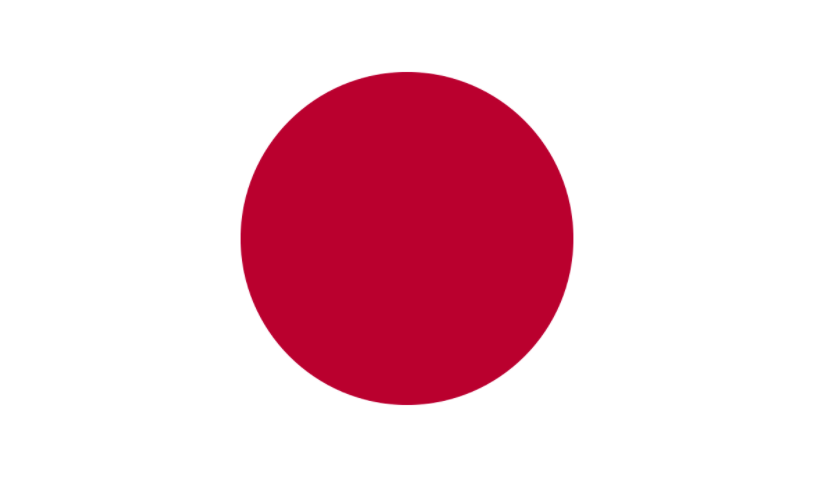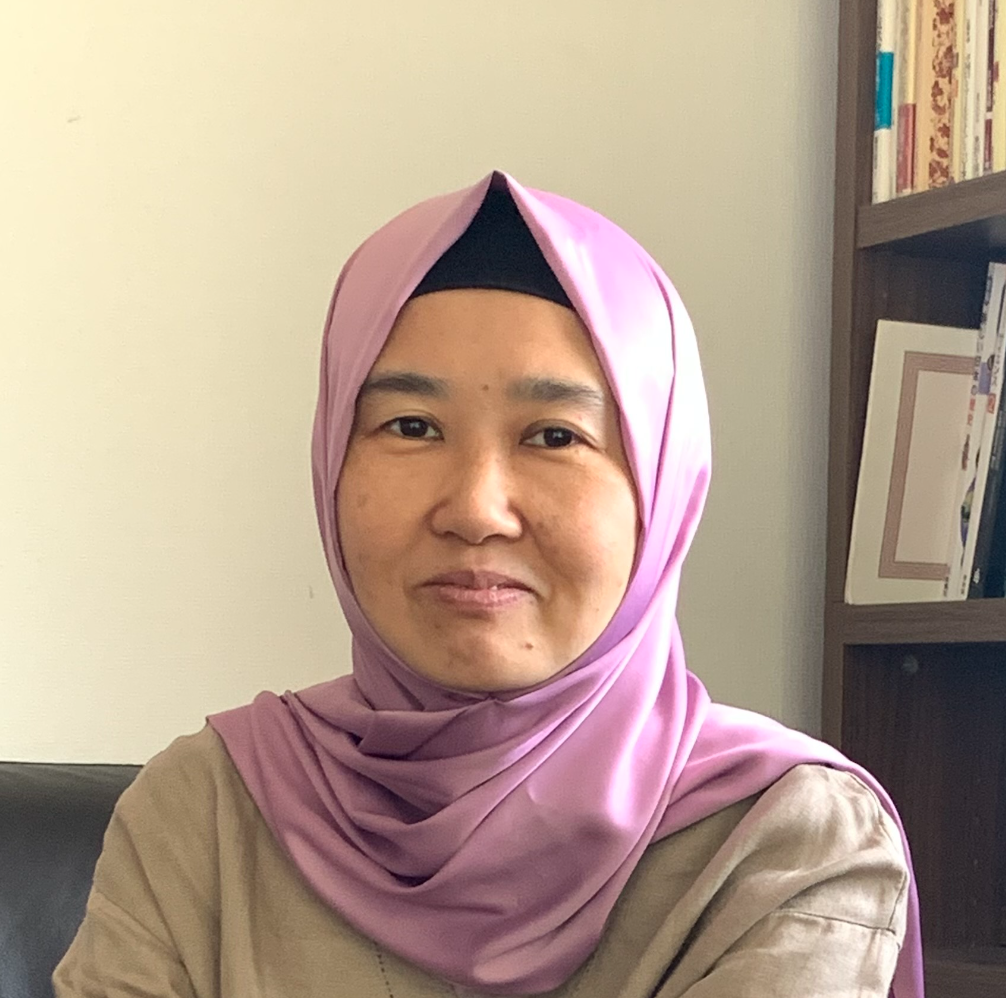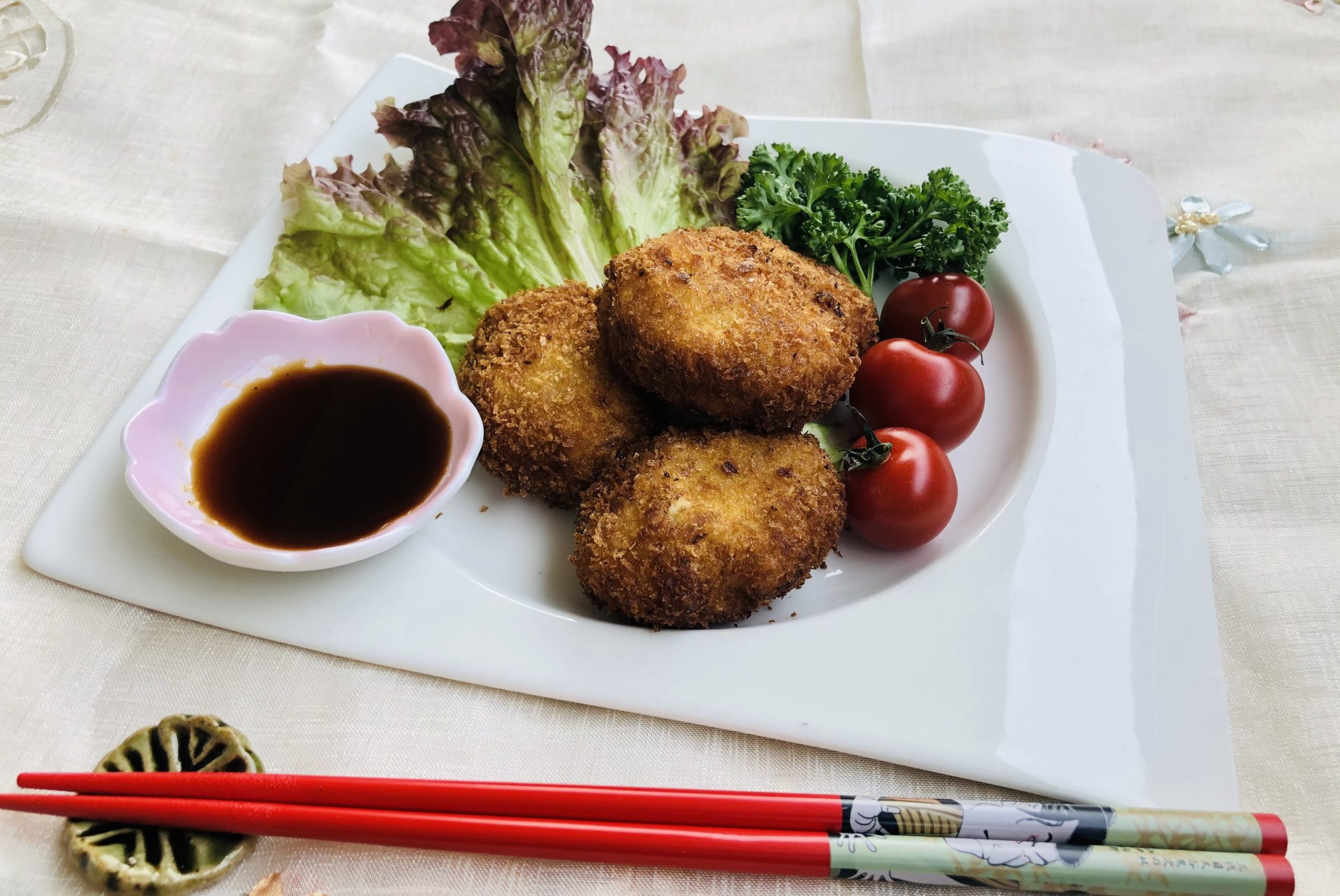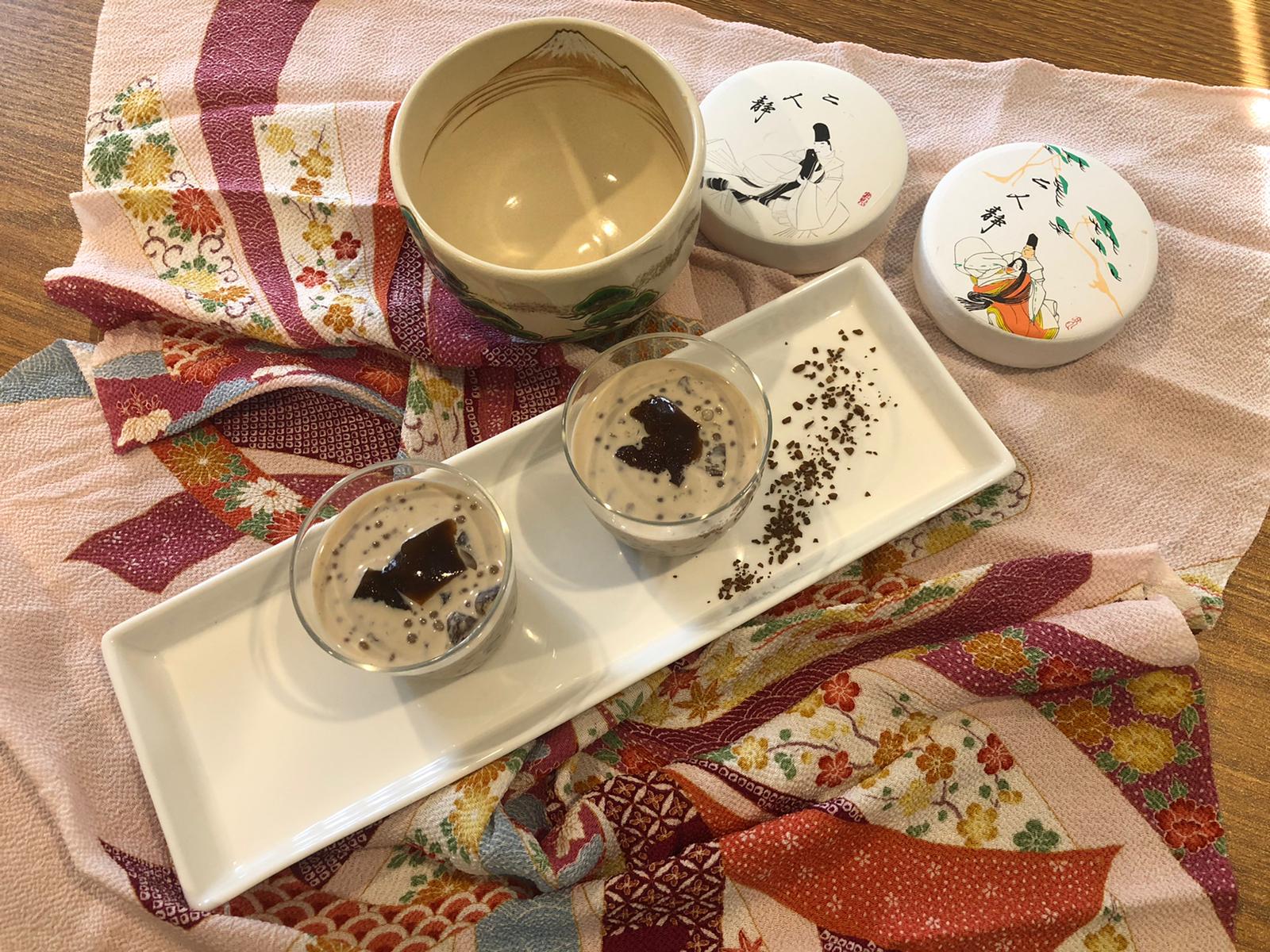Rie’s Korokkee (Japanese-style Potato Croquette)
 Japan
Japan 
I am Japanese and have lived in Japan my whole life. I converted to Islam about twenty years ago. Sueda’s mother was one of the first two Turkish two ladies I met and that friendship led to my marriage and my involvement with extended Turkish communities around the world.
My elder son Enes used to be Sueda’s classmate and about 10 years ago, my husband organized for a small group of students including Enes to experience school life and a homestay in Australia for a short period of time. Amity College (it was called Sule College in those days) was their destination and so I would describe my family as friends of Amity College and of Sueda’s family.
Ramadan is unquestionably the most special time of year for every Muslim; filled with personal contemplation and unforgettable experiences. And every time this bountiful month rolls around, it reminds me of the Ramadan twenty years ago that led me to prepare and accept the belief in Islam.
My interest in Islam dates back to my high school days; while most of my friends were interested in Western culture, I was more interested in Asian and African countries. I happened to see a wonderful movie called ‘Lawrence of Arabia’. I loved that movie so much, I watched it again and again until the sound degraded on the old VHS tape. The exotic scenes, magnificent views and traditional garments were so impressive. I quickly became interested in Arabs and their culture. In those days the Middle East and its culture was less familiar in Japan and I couldn’t find many books about it in the local library. Still, there were enough of them to rouse my interest and I soon became acquainted with the religion of Islam, albeit at that time as more of a culture rather than a belief.
I was born into a Buddhist family and, as is the case with the majority of Japanese people, my family weren’t really that religious. Religion, in my memory, seemed to have more to do with rituals for the dead than anything else. Generally, in Japanese culture, people have strong morals – but morals are separated from religion. Being very religious can be considered somewhat dangerous and a person who relies on a religious belief can be seen as ‘weak’. I was born and raised in this context and never had any real understanding of Buddhism.
Through my readings, I started to notice some similarities in ethics and living practices that Japanese and Arab people share, which surprised me considering the geographical distance between us. My readings also exposed me to different values, ways of thinking and perspectives from a different culture. The Islamic way of viewing the world seemed logical and convincing to me.
My interest in the Middle East and Islam continued into my university years when I took a course which was an introduction to Arabic language. It was as a junior student that I had a turning point in my life. I was experiencing some difficulty with friendships and decided I needed a change. I began putting more effort into my Aikido training (a Japanese martial art) and I started working part time as a waitress. The more I practiced Aikido, the more my skills improved. I became happier and focussed. But one day during practice, I fell and broke my foot.
I tried to act as if everything was okay but in reality, I lost my source of energy without Aikido and a part time job. Even living in a dormitory with forty people and a few close friends, I felt lonely and I was unhappy that no one had extended a helping hand. This negative thinking slowly started to undermine my spirit. One day, I ran from the dorm and burst into tears with a feeling of utter helplessness. I was suffering from depression.
My parents took me home for rest and medication. I recovered gradually and returned to normal life. My broken foot healed and in the process of getting better, I reflected on what I had been through.
First of all, thankfulness was the most outstanding feeling. It was a tough experience, but thanks to the hardship, I could see some new, hidden and unknown sides to myself. During counselling, I realised that I had been pretending to be strong for so long and had not asked for help from people around me. Before the accident I believed I could do anything if I strived to the best of my abilities; if I failed at something it must have been due to a lack of effort on my part. But during this tough time I could do nothing and felt helpless.
Unusual and unfamiliar ideas kept popping into my head though: Perhaps I don’t control myself; maybe there is an entity or some kind of power that controls me and my life. That ‘entity’ controls not only me but the whole universe. That ‘entity’ gave me hardship so that I would learn from it. That ‘entity’ wants me to learn…
I felt inspired by these ideas and thoughts but they were strange and perplexing. What is this ‘entity’? A vague image emerged from my mind. It must be ‘Allah’, who I had read about in those books about Arabs and Islam. That was the moment the word ‘Allah’ started to transform into something that related to my own beliefs.
My senior year started and I had to write a thesis. I was majoring in English linguistics and was especially interested in sociolinguistics. I wanted to write something about Islam and Arabic language, so I set out to find a place where I could meet Arabs. I found the Arabic Islamic Institute in Tokyo and visited the principal who promised to help me with my research. He invited me to join his Arabic lessons and in the class there were a few Indonesian guys and some female Japanese converts. They were the first Japanese Muslims I had ever met. I owe a lot to those sisters for my journey to the way of Islam. They were very welcoming and we soon became good friends. We started to meet outside class, with some of them inviting me into their homes and serving the most delicious food from their husbands’ home country. Sometimes I would be invited to study groups.
After graduation, a few years passed and I had not been successful in finding a job. There were gloomy days. My friendship with Islam continued, but despite some belief in Allah and my respect for the teachings of Islam, I couldn’t imagine conversion. I kept thinking about the difficulties of living as a Muslim in Japan and opposition from my family. It seemed good enough to have the belief in my mind and partially apply Islamic teachings to my life.
I was working as a secretary at a Middle Eastern embassy in Tokyo when the Ramadan that changed my life arrived. The embassy staff were all fasting so out of curiosity I gave it a try and was invited to share the joy of breaking the fast with them. Other Muslim friends also invited me for Iftar and took me to mosques to join tarawih, a special night prayer only prayed during the month of Ramadan. It was amazing and touching to see so many believers from different parts of the world standing in lines and making movements of prayer according to the calls by Imam. I listened to Quran recitations at home repeatedly and even tried to read out some short chapters. The trial fasting, along with the mosque visits, practices and activities ignited something deep in my heart. I felt something very special; an emotion that could hardly be described with words.
The first day of Eid came at the end of the month of Ramadan and I was taken to a mosque by close friends of my Muslim sisters to join the Eid prayer. I stood at the end of a prayer line and I started to weep; I couldn’t stop. I was perplexed and overwhelmed by this feeling that had suddenly seized me. I kept asking myself, ‘what do I want and what is the right choice?’ I called an Egyptian friend who gave lectures at an Islamic study group. She said, ‘Don’t be afraid of anything but Allah’. Her words helped me make my decision. I knew in my heart that having belief alone was not enough, but that belief and acts are inseparable. At the mosque, I asked the imam to make shahada, confession, to accept Islam.
Each Ramadan I recall my starting point as a Muslim and I thank Allah for his guidance. Happy Ramadan to all of you, I wish all of us will do our best to make the most of this sacred month full of opportunities and mercy of Allah!
The recipe I’m sharing is for Korokke – Japanese style potato croquettes, We serve them as a main course. It’s a popular, typical and not expensive dish for home cooking and is liked by everybody.
Potatoes are the main ingredient and the croquettes are often made with ground beef and pork which my mom used to do when I was a child. Now being Muslim, I make them either with vegetables or with canned tuna. (Getting halal meat in Japan is probably more difficult than in Australia and canned tuna is so much easier to get from the market.)
I got the idea of mixing cucumber, carrot and sweetcorn from a deli shop in our neighbourhood, and Veggie korokke are our family’s favourite. I sometimes make this for my Turkish friends whether it is Ramadan or not but during Ramadan I cook this every time I have Turkish guests because it’s a typical Japanese dish liked by everyone. Some Japanese dishes are not so easy to eat for non-Japanese people when they’re not used to the tastes and smells. My children love it and that’s another reason I make it from time to time. For the guests I cook meat as main dish and cook the korokke as side dish. Some of my Turkish friends do see it as one of my specialities.
We serve the korokke with green salad or in the old days (from my childhood) julienned cabbage. And
with a Japanese brown sauce – a bit like a thicker sweeter version of Worcestershire sauce: https://justhungry.com/handbook/reference/mystery-japanese-sauce. We don’t eat it with soy sauce.
Rie Komuro
Tokyo, May 2021
Share this story

Boil the potatoes until softened. Peel the skin and mash them.
Slice the cucumber, sprinkle with salt, leave for about 10 minutes then squeeze out the excess water.
Meanwhile cut the carrot into small pieces and boil until softened.
Put potato, carrot, canned corn and the cucumber into a bowl and sprinkle with salt and pepper to taste. Mix well with your hand. 
For korokke with tuna, add chopped onion and canned tuna instead of carrot, cucumber and corn.
Form the mixture into egg-shaped balls.
Flour the balls, dip into beaten egg, and roll in breadcrumbs.
Deep-fry the balls.
Serve hot. Japanese brown sauce goes well with Korokke but ketchup is also fine.




